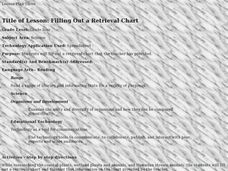Curated OER
Cell Discoveries
Students observe, compare and describe cell organelles in terms of their function, structure and operation. They enter and edit information in a database, build and sort a student-designed database and find records in a database.
Curated OER
Pigs, Pigs, Pigs!
Third graders find information about different breeds of pigs using the Internet, books, and encyclopedias. Groups select one breed of pig that interests them. They construct a stuffed likeness of the pig.
Curated OER
Dirty Mud
Students examine geological information to study benthic marine habitats. For this watershed project, students examine wetland habitats and land uses in a watershed. They will use geological information to discuss the impact of pollution...
Curated OER
The Census of Marine Life
Students explain diversity and abundance in marine life. In this oceanic biology lesson, students collect information for various geographical areas to collect a census of marine life.
Curated OER
The Solar Cycle
Students research the solar cycle. In this Science lesson, students use the internet to investigate the solar cycle. Students produce a spreadsheet and graph from the information collected.
Curated OER
Heat Pollution and Communities
Students examine thermal pollution by collecting temperature data on the school's photovoltaic panel. Students collect data for four consecutive days and retrieve information from other classes that meet at different times of the day. ...
Curated OER
Daily Weather Calendar
Third graders use the internet to record the daily weather conditions. Using symbols, they take the information they gathered and create an easy to read chart. They share their charts with the class to end the lesson.
Curated OER
Chesapeake Bay
The Chesapeake Bay is the largest estuary in the United States. Explore its origins, organisms, and contributing rivers with this PowerPoint. It opens with several slides of general information on the formation of estuaries, then it...
Conserve Wildlife Foundation of New Jersey
The Great Peregrine Scavenger Hunt - On the Internet
The story of one bird provides valuable insight into general animal behaviors and interactions. Young researchers investigate the peregrine falcon using a web search. They analyze the behaviors of the raptor including its migration...
Baylor College
Gases Matter
As a demonstration or as a hands-on activity, your class watches as the combination of vinegar and baking soda produce carbon dioxide gas. The intent of the lesson is to help youngsters understand that gases occupy space. It is included...
Baylor College
Hormones and Stress
As a more personal part of a unit on brain chemistry, your class discusses stressful situations and the body's response to them. They talk about how, while the reactions are initially helpful, some can be harmful to your health. Finally,...
Curated OER
Do You Need a Map?
Students explain ways marine navigation is important in modern society. For this map study lesson students use a retrieval tool to obtain real-time information on weather forecasts.
Curated OER
Filling Out a Retrieval Chart
Fourth graders generate a spreadsheet that includes research about coastal plants, wetland plants and animals and Hawaiian stream animals.
Curated OER
Researching Plant Life
Fourth graders examine the process of photosynthesis. Given websites about plant life, 4th graders retrieve and record accurate information about the parts of the plant and photosynthesis. Students solve a "Plant Life Mystery" from...
Curated OER
How Does the Moon Affect Tidal Range?
Eighth graders study the phases of the moon. In this tides lesson students use the Internet to retrieve information.
Curated OER
Food From Trees
Student use online resources to describe and compare food from trees. They take a nature walk, look for trees that give animals or people food and place foods found on a chart. In addition, they visit related sites for information.
Curated OER
Getting the Oil Out
Young scholars discover ways of obtaining oil by participating in an experiment. In this natural resource activity, students identify diagrams of oil derricks and pumps in order to visualize how oil is retrieved from the earth. Young...
Curated OER
Load! Ready! Fire!
Learners will identify the parts of a cannon and practice demonstrating a mock firing. In this math and science lesson, students read background information on the cannon and its firing. Learners read about and role play positions near...
Curated OER
Weather Watchers
Students practice using objective and quantitative means to describe and compare the weather. They compile weather conditions and create a spreadsheet to record their findings.
Curated OER
Chew on This
Eighth graders explore and demonstrate the seven steps of the scientific method. They predict how much sugar is in chewing gum and test, analyze, and calculate the sugar content of gum.
Curated OER
Sorting
Students study how things are stored and how information is retrieved. In this investigative lesson students play a game that helps them to see how things are sorted in a library.
Curated OER
Resource Based Learning Unit Using Mad Cow Disease
Young scholars research the topic of mad cow disease. They use an internal research network to search for newspaper and magazine articles about the disease. They are to evaluate the information they find and determine if it is creditable.
Curated OER
Sorting
Students explore how to logically sort and store information in order to make it easy to manage and easily retrieved. They explore methods they can use to organize and manage information.
Curated OER
Weather "Toons
Student use a variety of resources including print, CD-Rom and Internet information to study a weather process. They design a weather cartoon citing the bibliographic sources from their research.

























